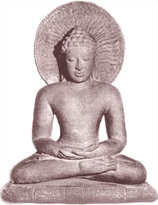
- Jainism is one of the most ancient living religions in the world, with its roots in pre-Vedic India.
- Jains realize that all souls are equal and thus do not subscribe to any notions of inequality between human beings on the basis of race, religion, caste or gender.
- Jainism propagates respect for life in all its myriad forms and hence Jains are expected to not commit any activities that cause needless harm to Nature. This is called the ANARTHADANDA VRATA. Hence, Jainism is probably the oldest religion to exhort its followers to lead simple eco-friendly lives.
- Jains recognise 24 Tirthankaras or fordmakers who promulgate the eternal teachings of the Jinas (perfect beings who have conquered the senses and are beyond all desire).
- Tirthankara Adinatha was the first Tirthankara of this era, and
Tirthankara Mahavira was the last.
- Each of the 24 Tirthankaras taught the path of liberation, giving the same message of non-violence, self control and self restraint.
- Anyone can be a Jain. There is no formal training required. No formal initiation. He / she who follows the teachings of the Jinas is a Jain.
- What does this entail? Conquering one's passions, controlling one's desire for sensual gratification and acceptance of responsibility for one's own thoughts, words and deeds.
- Jainism sees the soul and body as two distinct entities.
- Jainism knows that the soul is eternal, whereas the body is impermanent.
- Jainism believes that the soul, when it sheds all insentient matter, is of the nature of pure bliss.
- The two come together when the soul is encumbered by passions and hence attracts fine particles of insentient matter called karmas, which cause temporal bondage.
- Jainism shows the process whereby the soul can shed this insentient matter, ridding itself of temporal bondage and attaining eternal bliss (which is its own true nature, merely obscured and impeded by the presence of karmas).
- Those who walk this path without any compromise are known as ascetics. They are fully committed to the goal of liberation.
- Those who follow this path partially are known as laypersons. While they realise the importance of liberation and the flawed, impermanent and vexing nature of temporal pleasures, they are unable to commit themselves fully to the goal of liberation.
- Jains venerate the Tirthankaras as they are liberated beings who have shown us the path of liberation.
- Jains do not believe that worshiping the Tirthankaras or anyone else can gain them spiritual or worldly goals.
- Jains do not believe in an omnipotent being who runs the Earth according to his / her wishes. Jains believe in personal responsibility and hold each living being responsible for its own acts of mind, speech and body.
- Jains venerate the Tirthankaras in order to imbibe their spiritual qualities, chiefly their attribute of VITARAGA, or being supremely unattached.
- The quest of each mundane soul is to attain this supreme unattachment, which would lead to the dissociation of all karmas from the soul thus resulting in eternal bliss as only a soul free from all karmas may attain its intrinsic quality of eternal bliss.
- Jains believe in the sanctity of all life forms and the right of each living being to live life free from fear. Hence, in Jainism, the greatest gift one may give is ABHAYA DANA, the right to live fearlessly.
- This is why Jains are lacto-vegetarians. Those Jains, who are aware of the cruelty caused to cows by the highly automated milk industry, have taken to veganism.
- Traditionally, Jains do not wear silk,leather or pearls, as these are obtained after exerting great cruelty to living beings.
- Jainism sees the earth, water, air and fire as one-sensed beings and hence Jains are expected to minimise the harm they cause to the earth, water resources, the air and the environment.
 Manish Modi
Manish Modi